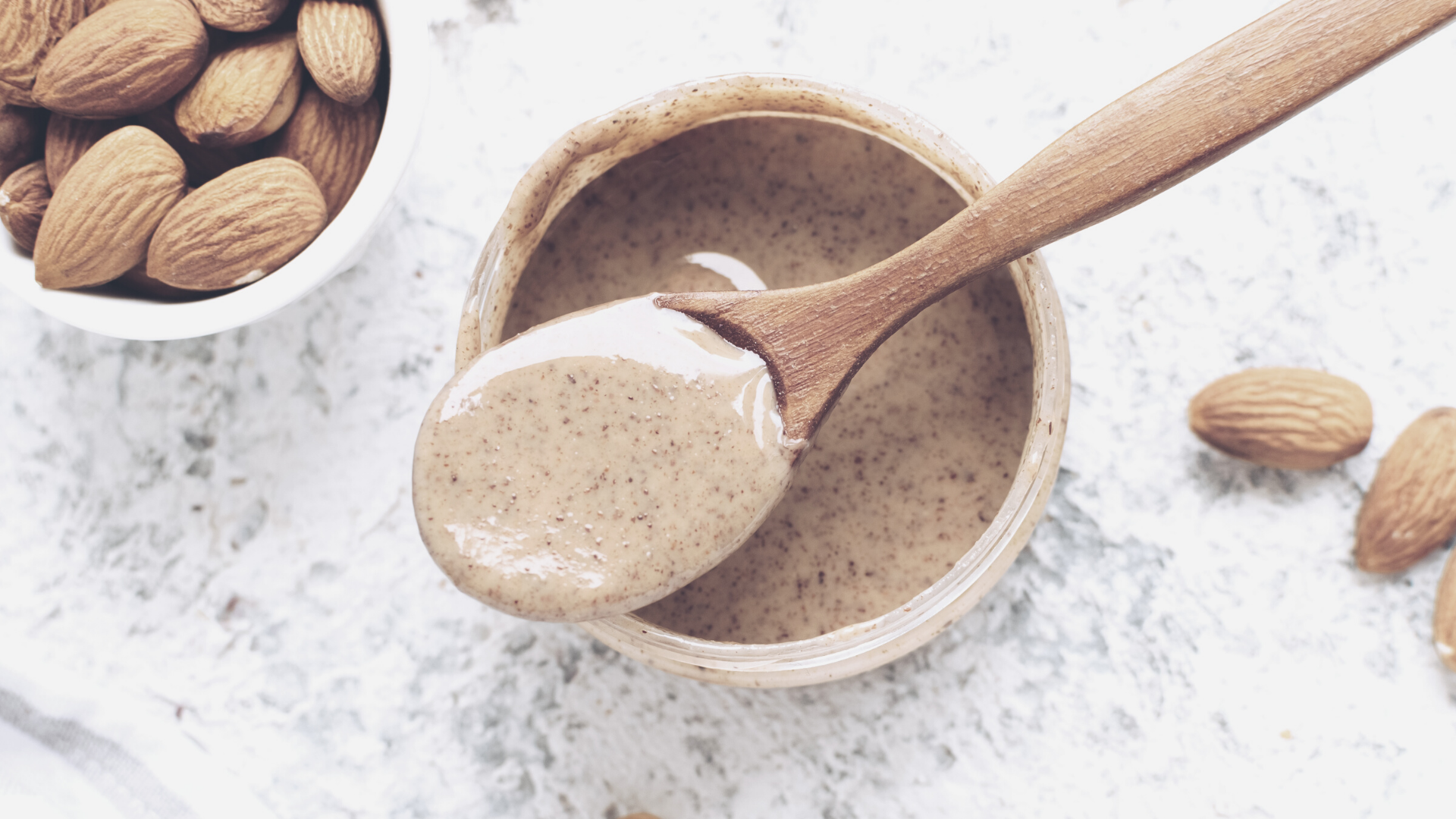I’m often asked about supplements to increase gut motility plus how to naturally increase gut motility.
So I have it for you today.
But first, what is stomach motility?
What is Stomach Motility?
Let’s go back to my post on Your Digestive System.
In the post, there was a paragraph which stated,
In a healthy gut, food moves through the GI tract through a process called peristalsis, which is a wave-like movement that helps push food forward. Other things contained in the GI tract help the process as well; chewing, digestive juices, stomach acid, bile, saliva, and enzymes.
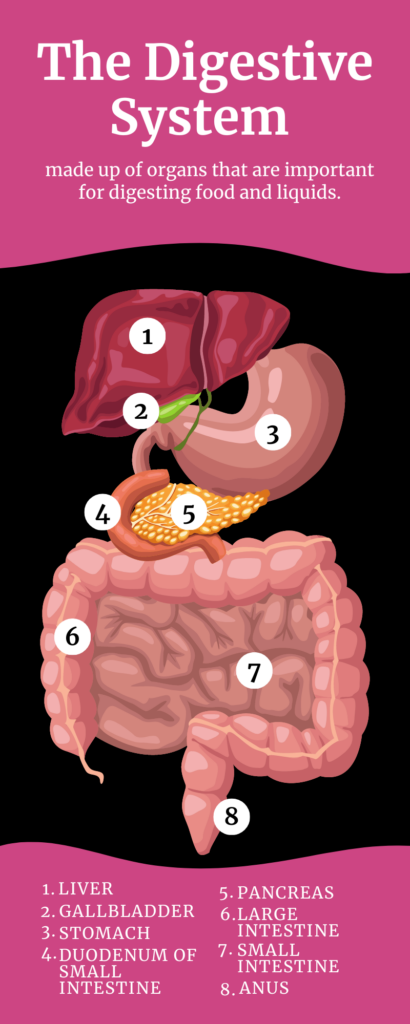
That process, peristalsis is also known as stomach (or gastric) motility. When functioning appropriately, the muscles in the intestinal walls contract and release. This pushes food (aka ‘bolus’) from the esophagus to the stomach, through the intestines and then out.
But when stomach motility is not working as it’s supposed to, those muscle contractions don’t work appropriately and the digestive transit is also inherently off. This means that food doesn’t pass through the intestines properly, causing slow gut motility.
When GI motility functions appropriately, it will, without a doubt, have a positive and significant impact on your overall digestive health.

What Causes Stomach Motility Issues?
In order to fix a problem, you need to understand the cause of that problem.
There are probably a hundred different causes for stomach motility issues. The culprit could be found at almost any point within the digestive system.
But many times, the cause is associated with a condition. So if you’ve been diagnosed with any of the below, oftentimes you’ll be able to identify the cause.
Here are 15 health conditions associated stomach motility conditions.
15 Associated Stomach Motility Conditions
Click HERE to save these for later.
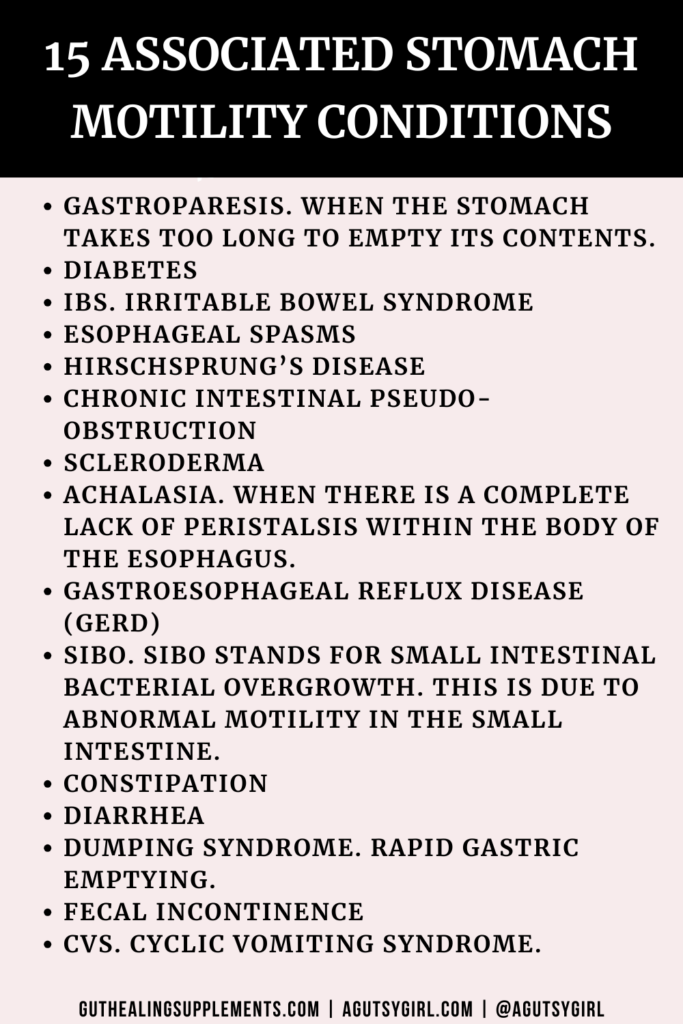
- Gastroparesis. When the stomach takes too long to empty its contents (slow digestive motility).
- Diabetes
- IBS. Irritable Bowel Syndrome
- Esophageal Spasms
- Hirschsprung’s Disease
- Chronic Intestinal Pseudo-Obstruction
- Scleroderma
- Achalasia. When there is a complete lack of peristalsis within the body of the esophagus.
- Gastroesophageal Reflux Disease (GERD)
- SIBO. SIBO stands for Small Intestinal Bacterial Overgrowth. This is due to abnormal motility in the small intestine.
- Chronic constipation
- Diarrhea (transit times are too fast)
- Dumping Syndrome. Rapid gastric emptying.
- Fecal incontinence
- CVS. Cyclic Vomiting Syndrome.
Not all stomach motility problems mean that motility is slow. If you have diarrhea, your motility is not slow.
For me personally, my main issue with the recurring SIBO was slow motility. And for you, slow motility might also be a huge culprit.
In that case, this next part (before we discuss the supplements to increase gut motility) is for you.
12 Ways to Increase Stomach Motility
Click HERE to save these 12 ways to increase stomach motility for later.
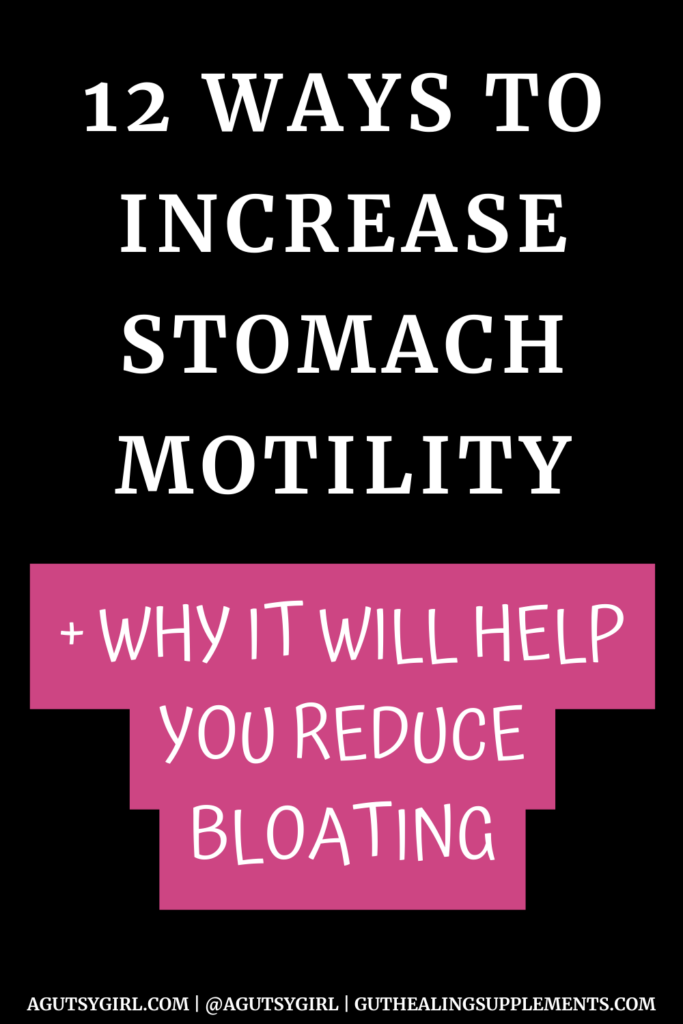
If you are dealing with symptoms like bloating, burping, reflux, nausea and abdominal pain, and infrequent bowel movements, then slow motility could be the culprit.
Please remember to work with your doctor on these prior to implementing. Circle the number(s) that you think might make most sense for you to consider, write them down in your journal, and bring it for discussion to your next appointment.
Fast
Fasting for at least 90-120 minutes between each meal is the only way the MMC (migrating motor complex) is activated to ensure healthy transit times. The MMC’s job is to “clean house.”
There is Intermittent Fasting and Meal Spacing.
I have found massive benefits with both, experiencing general increases in overall health, but you must ensure you’re practicing them in an optimal way unique for you.
Or Eat Smaller Meals
Many experts will say that if you eat 4-6 smaller meals, stomach motility increases. This is likely because the average stomach empties approximately 1‐4 kcal/min.
However, I still maintain that even if you practice this, you should also ensure that 90-120 minute fast in between meals.
And/but by no means do you want to restrict overall calories. Because….
Fix Hormonal Problems
Restricting calories leads to hormone issues.
Hormones are heavily involved in the digestive process.
In fact, did you know that the effect of different foods on gastric emptying is in large part due to the hormones released from the gastrointestinal tract that provides feedback regulation of gastric emptying and healthy motility?
Learn more about GI Hormones HERE.
Take a Prokinetic
A prokinetic is something that stimulates movement or gastrointestinal motility. Prokinetics I have use(d) and love include: LDN(low dose naltrexone), ginger, magnesium, Iberogast, and MotiliPro.
I have put together an entire list of both pharmaceutical and non-pharmaceutical prokinetic options HERE.
More on these below in the supplements to increase gut motility section.
Stimulate the Vagus Nerve
Stimulating the Vagus Nerve is critical to motility and overall gut health because teh sympathetic nervous system controls the final elimination of waste.
You can learn all about the Vagus Nerve and how to stimulate it HERE.
Chew Your Food
Did you know, you should chew each bite of food 30-40 times prior to swallowing?
The more your teeth grind food down, the less work (= time) your digestive tract has to do.
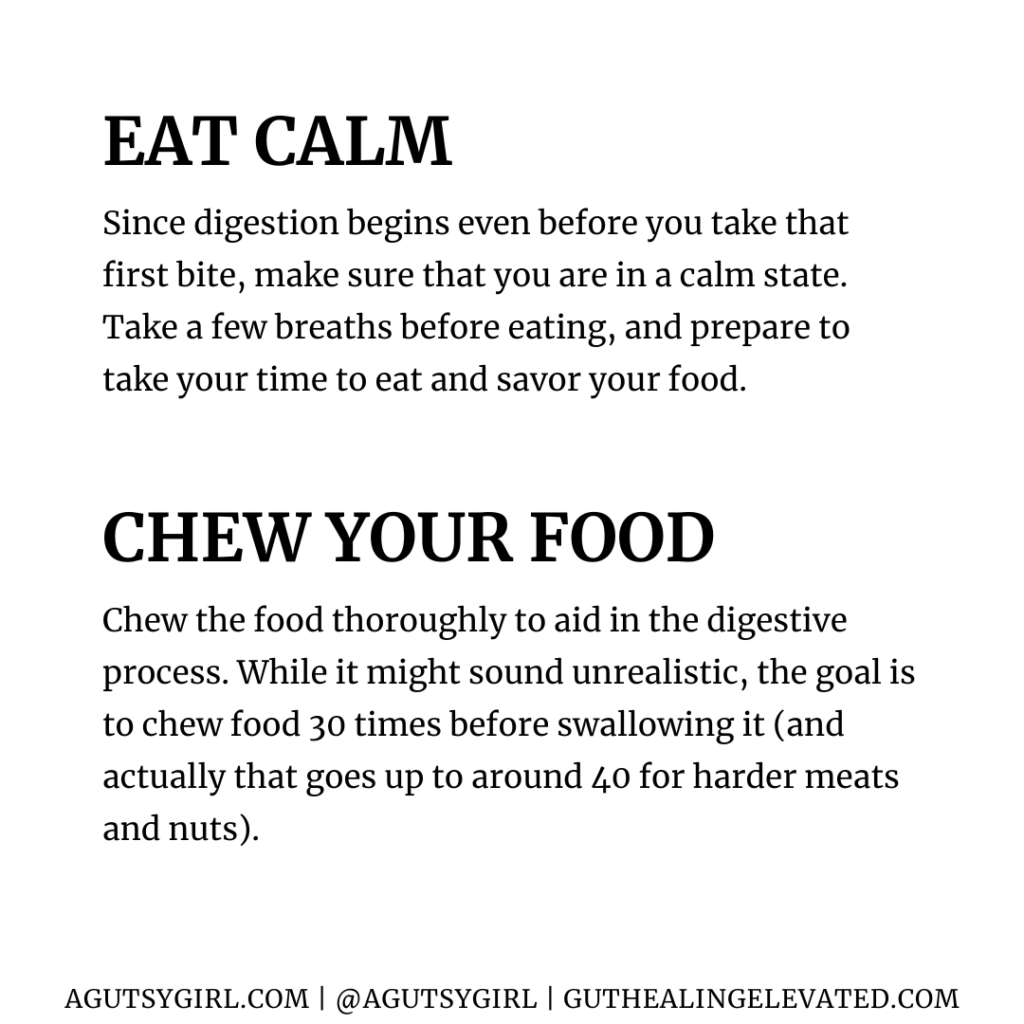
Don’t Drink Water with Your Meals
While you should drink more water in general for healthy digestion, drinking water with meals can dilute digestive juices and interfere with digestion.
Water is critical for motility and optimal digestion.
Movement Post-Meal
Instead of laying down within a couple hours of eating, choose to get gentle movement in.
If you can’t walk, then even just sitting upright will help.
Regular exercise promotes proper motility and healthy bowel movements.
Note: remember, there is a limitation on this exercise, which I discuss at length in Workouts and Gut Healing.
Choose Fiber Wisely
Insoluble vs soluble fiber might be a better temporary option.
Dietary fiber can promote intestinal health by regulating the composition and metabolism of bacterial communities, providing energy to colonic epithelial cells, promoting the production of intestinal mucosa, stimulating intestinal motility, and maintaining intestinal integrity. source
Be More Selective with Fat and Meat
Both fats and meat can slow down the digestive process.
Ways to help with this include: naturally breaking down fat, using HCl, accompany heavier meals with digestive enzymes, and/or eating the fats and meats with easy-to-digest foods.
I have done all of this at various times! Note: please do not believe that fat and meat are to be vilified. For most, they are not the villain.
Avoid Alcohol
The NIH states that,
Chronic alcohol intake leads to intestinal inflammation, including altering intestinal microbiota composition and function, increasing intestinal permeability, and affecting the intestinal immune homeostasis.
There are literally ZERO great reasons for drinking alcohol, even though societal standards have us believing otherwise.
For the purposes of this article, high alcohol concentrations (i.e., above 15 percent) appear to inhibit gastric motility.
Treat the Underlying Condition
Last, but certainly not least: you must know and treat the underlying condition.
In fact, this is the number one way you will be able to increase stomach motility.
Slow motility doesn’t occur on its own. There is always a reason for it. Find the reason, fix the issue, and the time spent dealing with the problem diminishes.
Sources: HERE, HERE, HERE, HERE, and HERE.
9 Supplements to Increase Gut Motility
Click HERE to save these supplements to increase gut motility for later.
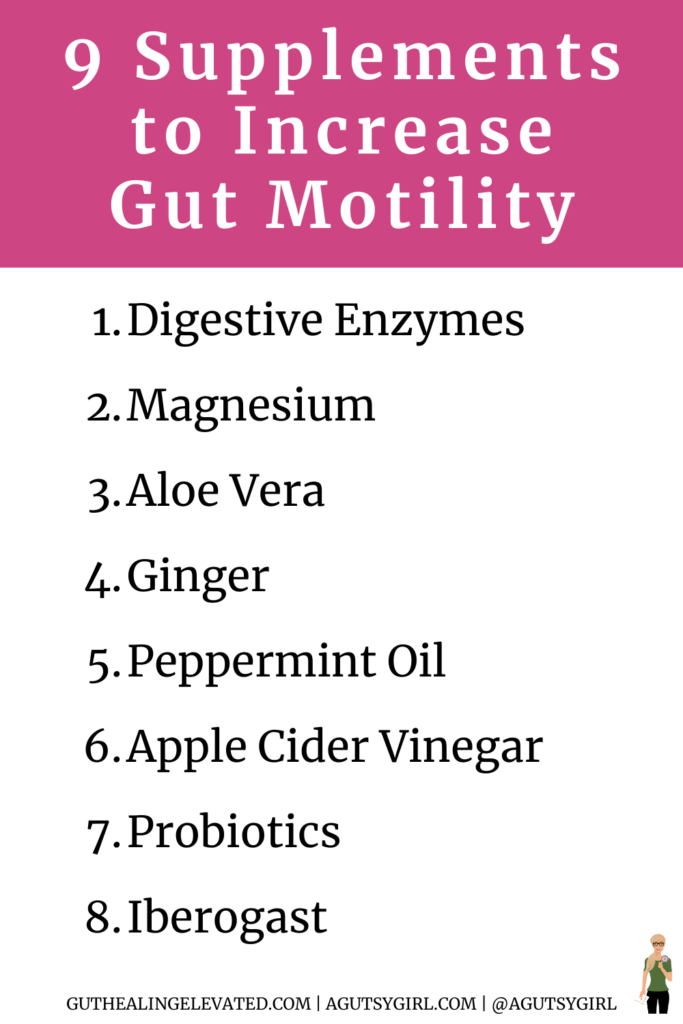
Improving gut motility involves various factors, including the dietary and lifestyle changes I have mentioned above.
But there are also some nutritional supplements to increase gut motility.
Here are my top 9 supplements to increase gut motility….
Digestive Enzymes
Not only do digestive enzymes help with occasional bloating, but they are a fantastic proactive practice for preserving and maintaining proper digestion as we age (digestive enzyme production decreases as we age).
Digestive enzymes help for stomach motility since they assist in the process of breaking food down which offers the transport of food through the digestive tract positive benefits.
In our digestive enzyme, Break Down, you’re provided with betaine HCl for supporting proper stomach acidity, lipases, proteases, amylases, lactase, glucoamylase and ox bile extract to aid in the digestion of fatty acids, proteins, carbohydrates, lactose and fat-soluble vitamins.
—–>>>>> Get Break Down HERE. Use code AGUTSYGIRL at checkout to save 15%. <<<<<—–
Magnesium
In order to understand how magnesium supplements can help with stomach motility, you need to understand the different types of magnesium.
There are two superior forms for aiding in more of a “laxative effect” when it comes to magnesium:
Magnesium Citrate
This is the most commonly used form of magnesium in laxative form. In fact, While Magnesium Citrate is a type of magnesium, magnesium in general is more of a supplement; the Magnesium Citrate, a laxative. The difference is the dose.
Magnesium citrate is the generic name for over-the-counter products such as Citroma or Citrate of Magnesia, which can be used as a laxative or dietary supplement. It belongs Magnesium citrate belongs to group of drugs known as saline laxatives, which work by pulling more water into the colon in order to help the colon empty its contents.
One thing to make note of when it comes to magnesium citrate is that it should not be considered for long-term use. Stimulant laxatives can ultimately results in a sluggish bowel. (This is the LAST thing you want if you’re already having problems with motiity.)
I have an entire post dedicated to Magnesium Citrate HERE.
Magnesium Glycinate
In addition to its calming effect and helping to promote better sleep, magnesium glycinate has been known to help reduce PMS symptoms and control blood sugar in those with diabetes.
This form of magnesium may relax the muscles in the intestines to allow for smoother and a more healthy digestive transport.
The glycinate form is highly bioavailable and less likely to cause diarrhea for sensitive individuals.
Aloe Vera
While I personally did not use aloe vera, the NIH states that it is commonly used as a strong laxative and as a substance to improve gastrointestinal motility.
Aloe Vera is well-known for its thick, fleshy leaves which contain a gel-like substance that has been used for centuries for its medicinal and skincare properties. The green part of the leaf and the yellow juice around the gel are oftentimes used in a juice or via supplementation for addressing gut issues.
The reason I did not use it while on my healing journey was due to my research on saccharides.
Aloe Vera is a polysaccharide, which forms a group of complex carbohydrates made of many chains of simple sugars. Due to their complex structure, polysaccharides are much harder for our bodies to break down. The small intestine has to break them down into smaller molecules before even attempting to try to absorb them.
You can learn more about Saccharides HERE.
Ginger
Ginger (Zingiber officinale) is a prokinetic that’s commonly used for increasing stomach motility.
The NIH conducted a study where they confirmed that the acceleration of gastric emptying by ginger demonstrated in healthy volunteers extended to patients with functional dyspepsia.
In another study they conducted, the gastric half-emptying time was less after ginger than placebo ingestion.
Peppermint Oil
Peppermint oil helps relieve stomach cramps, bloating and farting (flatulence), particularly if you have irritable bowel syndrome (IBS).
It works by helping the muscle of the bowel wall to relax.
Make note: Peppermint Oil is not good for those with GERD and acid reflux.
—–>>>>> Get Peppermint Oil HERE through my Fullscript Dispensary. <<<<<—–
Apple Cider Vinegar
Simply put, apple cider vinegar is a vinegar that is made from fermented apple juice.
But this isn’t the apple juice you buy on a grocery shelf with multiple ingredients and 32g of added, random sugars.
No, the best apple cider vinegars are made by taking fresh, organic apples, crushing and juicing them and creating the vinegar from that.
The NIH states, “The effect of vinegar on the rate of gastric emptying was statistically significant.”
But even so, there isn’t a ton of science behind this. And yet, here are 5 reasons why apple cider vinegar might help with motility:
- The pectin content in apple cider vinegar is high, as is the range of apples. In the digestive system, pectin can aid in the movement of food.
- Contains a small amount of magnesium, which helps with constipation.
- The high level of acidity acts as a natural laxative by stimulating the colon into peristalsis (muscle contractions that move waste through the colon).
- It contains natural probiotics, which may help with your immune system and gut health.
- ACV contains acetic acid, and research shows that both acetic acid and butyric acid could relieve constipation.
Read more about apple cider vinegar, digestive issues, and bowel movements HERE.
Probiotics
Modifying the gut luminal environment with certain probiotic strains may affect motility and secretion in the gut and, hence, provide a benefit for patients with constipation.
Futhermore, a small number of studies have now shown that the beneficial effects of probiotics on gut motility are mediated through the nervous system, providing evidence that probiotics may help regulate the ENS or CNS to normalize gut motility. source
The reason for this is fairly straightforward: an imbalance or dysfunction in the gut microbiota may contribute to atypical gut motility and, consequently, symptoms of constipation.
Iberogast
Iberogast is a highly sought-after supplement for motility and its ability to strengthen movement of muscles in the digestive tract.
It has indications for functional dyspepsia (FD) and irritable bowel syndrome.
This supplement is a liquid herbal tincture taken with or following meals that promotes gut motility and gastric emptying and reduces dyspepsia.
Its formula contains the following herbs:
- Bitter candytuft
- Angelica
- Chamomile
- Caraway
- St. Mary’s thistle
- Lemon balm
- Peppermint
- Greater celandine
- Licorice
—–>>>>> Find Iberogast HERE <<<<<—–
HCl
And last, but certainly not least – HCl (hydrochloric acid).
This is not one that’s regularly talked about for motility, BUT if you have low stomach acid, it should be considered.
An increase in HCl and decreasing pH level also signal gastric motility to turn on to move the partially digested bolus of food along and help kill bacteria normally ingested with food. source
Due to multiple factors, namely lifestyle, stomach acid production can drastically reduce.
Low stomach acid also called hypochlorhydria, is when the body doesn’t produce enough in order to break down proteins into essential amino acids and nutrients the body needs. (By the way, there is also something known as achlorhydria, which is even lower stomach acid than hypochlorhydria.)
HERE are 33 ways to tell if you might be dealing with low stomach acid.
Chronically low stomach acid contributed to chronic slow motility for me personally.
When I supported the increase of overall stomach acid with lifestyle, diet, and Increase Now, my stomach acid drastically improved and thus normal motility did as well.
—–>>>>> Get Increase Now HERE. Use code AGUTSYGIRL at checkout to save 15%. <<<<<—–
I hope this article on stomach motility – ways to support it with lifestyle and supplements – helps.
If you liked this post on supplements to increase gut motility, you might also enjoy:
Xox,
SKH
🤰 bloating be gone! weight loss through optimal gut health for women
💃ʜᴇᴀʟ ʏᴏᴜʀ ɢᴜᴛ. ʜᴇᴀʟ ʏᴏᴜʀ ʟɪfe.
🫶🏻 founder gutbyome.com

